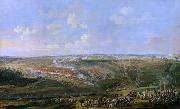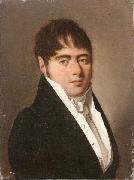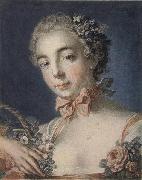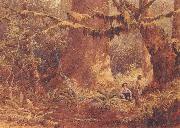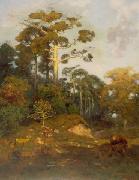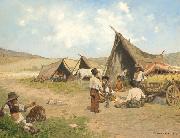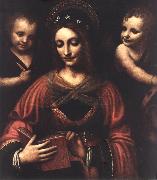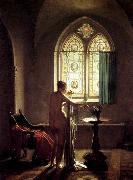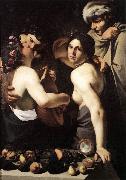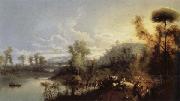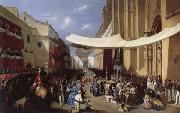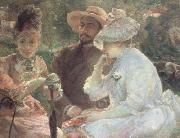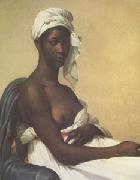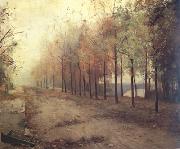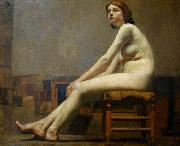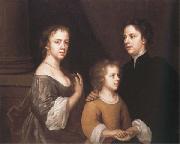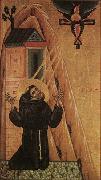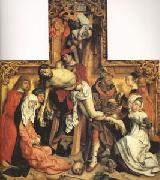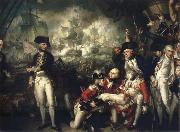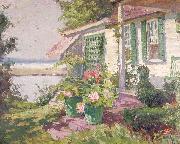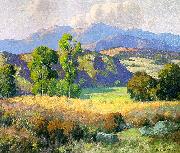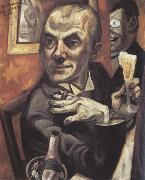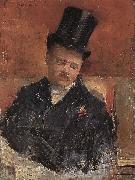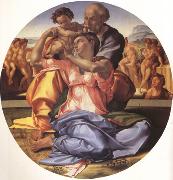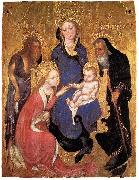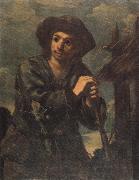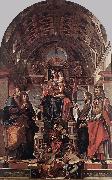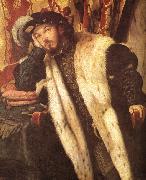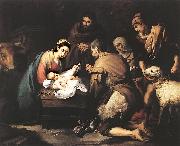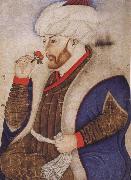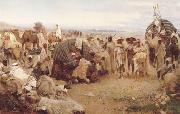|
|
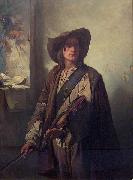 |
Louis Gallait
|
|
(9 or 10 May 1810 - 20 November 1887) was a Belgian painter. His d his reputation especially with the large painting of Charles V's abdication. Gallait's works were considered as the basis for a desirable renewal of historical paintings because of the realism, costume faithfulness and colorful posture of his paintings. His last artwork was sent on tour in Germany and that led to new signals even among German historians. He was also a distinguished portrait painter.
Gallait died in Brussels in 1887. There is a painting by Louis Gallait at the Norton Art Museum in West Palm Beach, Florida ("Art and Liberty").
|
|
|
|
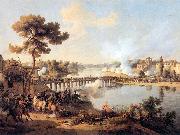 |
Louis-Francois, Baron Lejeune
|
|
(3 February 1775, Strasbourg - 29 February 1848) was a French general, painter, and lithographer. His memoirs have frequently been republished and his name is engraved on the Arc de Triomphe.
He studied painting in the studio of Pierre-Henri de Valenciennes, alongside Jean-Victor Bertin, but left the studio to volunteer in the Compagnie des arts de Paris in 1792. He received his baptism of fire in the battle of Valmy later that year. He became a sergeant in the 1st Arsenal battalion and in 1793 moved to the artillery at La Fere, assisting in the sieges of Landrecies, Le Quesnoy and Valenciennes. At Valenciennes he became aide-de-camp to general Jacob then, as a lieutenant on attachment to the engineers, took part in the 1794 Holland campaign and the 1795 campaign.
Called to the depot in 1798, he succeeded brilliantly in his exams and was made a captain on attachment to the engineers. He became aide-de-camp to marshal Berthier in 1800, a post he retained until 1812 and in which he took an active part in practically all of the Napoleonic campaigns. He was wounded and captured in Spain. He was promoted to full captain after Marengo and chef de bataillon after Austerlitz, also become a knight of the Legion d'honneur and a colonel at the Siege of Saragossa.
The German campaign of 1806 brought him to Munich, where he visited the workshop of Alois Senefelder, the inventor of lithography. Lejeune was fascinated by the possibilities of the new method and whilst there he made the drawing on stone of his famous Cossack (printed by C. and ~f. Senefelder, 1806). Whilst he was taking his dinner, and with his horses harnessed and waiting to take him back to Paris, one hundred proofs were printed, one of which he subsequently submitted to Napoleon. The introduction of lithography into France was greatly due to the efforts of Lejeune.
In 1812, during the French invasion of Russia, he was made general de brigade and chief of staff to Davout. Frostbitten on the face, Lejeune left his post during the retreat from Russia and was arrested on the orders of Napoleon. Freed in March 1813, Lejeune was then sent to the Illyrian provinces, before rejoining the army under the orders of marshal Oudinot, becoming his chief of staff. During the Saxony campaign, Lejeune was present at the Battle of Lutzen (1813), the crossing of the River Spree and at Bautzen. He was made an officer of the Legion d'honneur and a commander of the Order of Maximilian of Bavaria. At the battle of Hoyersverda, when Below's corps wiped out the 12th corps formed up in square on the plain, Lejeune (at risk of being kidnapped) ventured into the enemy lines with one battalion, general Wolf's cavalry and six 12 pounder guns. He thus broke the whole of the Prussian artillery and saved marshal Oudinot and his army. Wounded several times and lastly at Hanau, he was authorised to leave the army in November 1813 after more than 20 years' service. After his departure from the army, he devoted himself to painting.
|
|
|
|
|
|
 |
Louise-Catherine Breslau
|
|
(6 December 1856 - 12 May 1927) was a German/Swiss artist.
Born Maria Luise Katharina Breslau in Munich, Germany, she spent her childhood in Zurich, Switzerland and as an adult made Paris, France her home. Suffering from asthma all her life, Breslau turned to drawing as a child to help pass the time while confined to her bed. Although she became one of the most sought after portraitists of her time, after her death she and her work were all but forgotten. It has only been in the past few years that interest in Breslau and her works has been growing.
Breslau was born into a prosperous bourgeois family; her father was a well-respected physician specializing in obstetrics and gynecology. When Breslau was two years old, her father accepted the position of professor and head physician of Obstetrics and Gynecology at the University of Zurich; Switzerland became home to the Breslau family. |
|
|
|
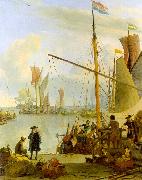 |
Ludolf Backhuysen
|
|
b.Dec. 18, 1631, Emden, East Frisia [Germany]
d.Nov. 17, 1708, Amsterdam, Neth.
Dutch
Ludolf Backhuysen Gallery |
|
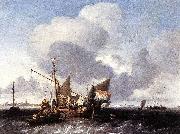 |
Ludolf Bakhuizen
|
|
(December 28, 1630 - November 17, 1708) was a German-born Dutch Golden Age painter who was the leading Dutch painter of maritime subjects after the two Willem van de Veldes (father and son) left for England in 1672.
He was born in Emden, East Frisia, and came to Amsterdam in about 1650, working as a merchant's clerk and a calligrapher. He discovered so strong a genius for painting that he relinquished the business and devoted himself to art from the late 1650s, initially in pen drawings. He studied first under Allart van Everdingen and then under Hendrik Dubbels, two eminent masters of the time, and soon became celebrated for his sea-pieces, which often had rough seas.
He was an ardent student of nature, and frequently exposed himself on the sea in an open boat in order to study the effects of storms. His compositions, which are numerous, are nearly all variations of one subject, the sea, and in a style peculiarly his own, marked by intense realism or faithful imitation of nature. In his later years Bakhuizen employed his skills in etching; he also painted a few examples each of several other genres of painting, such as portraits, landscapes and genre paintings. |
|
|
|
|
|
 |
ludwig van beethoven
|
|
Born: December 1770
Birthplace: Bonn, Germany
Died: 26 March 1827 (cirrhosis of the liver, plus dropsy)
Best Known As: The composer of Beethoven's Fifth |
|
|
|
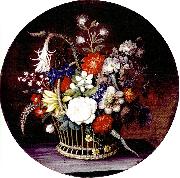 |
magdalene margrethe barens
|
|
Magdalene Margrethe Bärens, född 1737, död 1808, var en dansk konstnär; hon blev den första kvinnliga konstnären i Danmark som valdes in i den danska konstakademin år 1780.
Hon var en av de få kvinnliga konstnärerna kända i Skandinavien före 1800-talet, tillsammans med Ulrika Pasch i Sverige och Helena Arnell i Finland. I Danmark var även Johanne Marie Fosie känd under samma tid. |
|
|
|
|
|
|
|
|
|
 |
Marcello Bacciarelli
|
|
16 February 1731 - 5 January 1818) was an Italian painter of the late-baroque and Neoclassic periods.
He studied in Rome under Marco Benefial. In 1750 he was called to Dresden, Saxony, where he was employed by Elected King Augustus III of Poland; after whose death he went to Vienna, and thence to Warsaw. There he met and worked by the side of Italian painter in Dresden, Vienna and Warszawa , Bernardo Bellotto. He was the Director there of the new set up Academy of Arts of Warsaw.He painted a set of the Polish kings, from Boleslaus Chrobry downwards. That of Stanislaus II, Stanisław August Poniatowski has been engraved by A. de Marcenay de Ghuy, Kestner, and A. Fogg. Bacciarelli also painted scenes from the History of Poland. He died at Warsaw.
A number of his paintings were painted for King Stanisław August Poniatowski of Poland and are in the Royal Castle in Warsaw. |
|
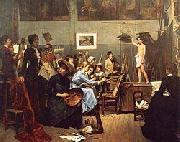 |
Marie Bashkirtseff
|
|
(Russian: November 11, 1858 October 31, 1884) was a Ukrainian-born Russian diarist, painter and sculptor.
Marie BashkirtseffBorn Maria Konstantinovna Bashkirtseva in Gavrontsy near Poltava, to a wealthy noble family, she grew up abroad, traveling with her mother across most of Europe. Educated privately, she studied painting in France at the Acad??mie Julian, one of the few establishments that accepted female students. The Acad??mie attracted young women from all over Europe and the United States. One fellow student was Louise Breslau who Marie viewed as her only rival. Marie would go on to produce a remarkable body of work in her short lifetime, the most famous being the portrait of Paris slum children titled The Meeting and In the Studio, (shown here) a portrait of her fellow artists at work. Unfortunately, a large number of Bashkirtseff's works were destroyed by the Nazis during World War II.
From the age of 13, she began keeping a journal, and it is for this she is most famous. Her personal account of the struggles of women artists is documented in her published journals, which are a revealing story of the bourgeoisie. Titled, I Am the Most Interesting Book of All, her popular diary is still in print today. The diary was cited by an American contemporary, Mary MacLane, whose own shockingly confessional diary drew inspiration from Bashkirtseff's. Her letters, consisting of her correspondence with the writer Guy de Maupassant, were published in 1891.
The grave of Marie BashkirtseffDying of tuberculosis at the age of 25, Bashkirtseff lived just long enough to become an intellectual powerhouse in Paris in the 1880s. A feminist, in 1881, using the nom de plume "Pauline Orrel," she wrote several articles for Hubertine Auclert's feminist newspaper, La Citoyenne. One of her famous quotes is: Let us love dogs, let us love only dogs! Men and cats are unworthy creatures. |
|
|
|
|
|
|
|
|
|
|
|
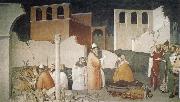 |
Maso di Banco
|
|
Italian Early Renaissance Painter, active 1320-1350 |
|
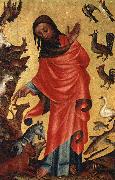 |
MASTER Bertram
|
|
German painter (b. cca. 1345, Minden, d. 1415, Hamburg). |
|
|
|
|
|
|
|
|
|
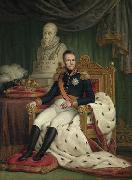 |
Mattheus Ignatius van Bree
|
|
was a Belgian painter, sculptor and architect.
He was born at Antwerp in 1773, was instructed by Regemorter; he afterwards went to Paris, and after having obtained by a 'Cato in Utica' the second prize for Rome, he went to that city in 1797e returning to his native country in 1804.[1] He painted numerous historical pictures, some of which are of large dimensions, and obtained a high reputation in Flanders. His conceptions are frequently poetical, and his compositions graceful, delineated with a light, free, and spirited pencil ; but his colouring is rather too florid in some instances.
He was first professor at the Academy of Fine Arts at Antwerp, and in 1827 its director. Member of several other scientific institutions like the academies of Amsterdam, Rome, Munich and New York. Among his most important works are 'The Patriotism of the Burgomaster Van der Werft,' in the Town-Hall at Leyden, and 'The Death of Rubens,' in the Museum at Antwerp. He brought forward some of the most eminent of the later Flemish painters, among whom are Wappers, De Keyser, F. de Braekeleer, and others of whom their country is justly proud. Van Bree died at Antwerp in 1839.
|
|
|
|
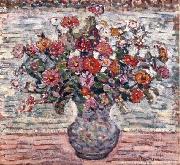 |
Maurice Brazil Prendergast
|
|
(October 10, 1858 - February 1, 1924) was a U.S. Post-Impressionist artist who worked in oil, watercolor, and monotype. Technically, he was a member of The Eight, but the delicacy of his compositions and mosaic-like beauty of his designs had little in common with the philosophy of the group.
Prendergast was born in St. John's, a city in Newfoundland, Canada. With the failure of his father's subarctic trading post, the family moved to Boston. |
|
|
|
|
|
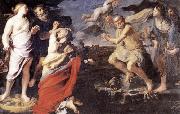 |
MEI, Bernardino
|
|
Italian painter, Roman school (b. 1612, Siena, d. 1676, Roma) |
|
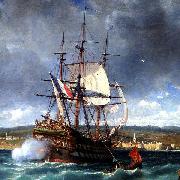 |
Michel Bouquet
|
|
(born 6 November 1925) is a French film actor. He has appeared in over 90 films since 1947. He was born in Paris, France.
|
|
|
|
|
|
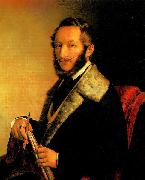 |
Miklos Barabas
|
|
(February 10, 1810 in Mărcuşa, now Romania - February 12, 1898 in Budapest) was a Hungarian painter. He his mostly known for his portrait paintings.
He was born in Kezdimerkosfalva. He spent most of his life in Pest, where he was director of the art society from 1862 until his death. He became a member of the Parliament of Hungary in 1867. He died in Budapest.
|
|
|
|
|
|
|
|
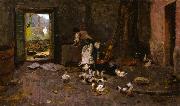 |
Mose Bianchi
|
|
(Monza, 1840-1904) was an Italian painter.
The family moved from Monza to Milan and Bianchi enrolled at the Brera Academy. Having interrupted his studies to serve in the second war of independence, he returned to attend the school of painting directed by Giuseppe Bertini. The award of a grant in 1867 enabled him to visit Venice and then Paris in 1869. He took part with some success at the Brera exhibitions and the Vienna Exhibition of 1873. It was in this period that he began to paint genre scenes in 18th-century settings and numerous portraits, soon becoming one of the artists most in demand with the Milanese middle classes. He returned to Venice in 1879 and visited Chioggia for the first time. Both places were to be featured also in later years in a series of intense views exhibited at exhibitions in Milan and Venice alongside genre scenes, views of Milan and landscapes of the countryside around Gignese.
|
|
|
|
|
|
|
|
|
|
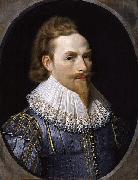 |
Nathaniel Bacon
|
|
(1585-1627) was a wealthy landowner from Culford, Suffolk, England.
self-portraitBacon was an exceptionally skillful amateur painter and gardener. Only a small group of 9 of his paintings survive. He was particularly known for his kitchen and market scenes, dominated by still-life depictions of large vegetables and fruit, often accompanied by a buxom maid, the most well known being "The Cookmaid with Still Life of Vegetables and Fruit" (Tate Gallery London). This predilection for cook or market scenes is much more common among Dutch and Flemish painters, see for example Joachim Beuckelaer (1533-1574), or from a later generation, Pieter Cornelisz van Rijck (1567-ca.1637), and Cornelis Jacobsz Delff.
Bacon is credited with the first known British landscape and also painted a self-portrait and a number of other portraits. He was created a Knight of the Bath in 1625, in honour of the Coronation of Charles I. He died at Culford Hall at the age of 42. He was buried there on 1 July 1627. His little daughter, Jane, aged three years, died that same October and is buried alongside her father. The entries of their burials follow each other in the Culford Parish Burial Register.
He was the son of Sir Nicholas Bacon, 1st Baronet. |
|
|








